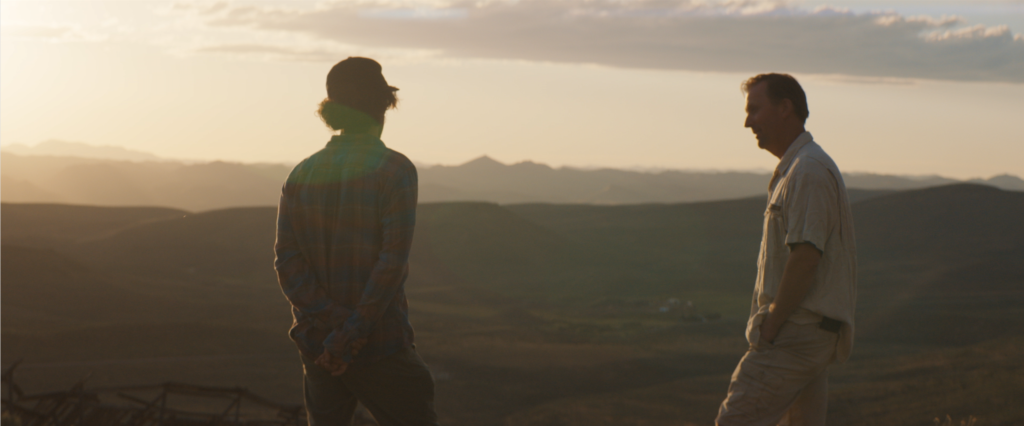
Big Mountain Snowboarder Jeremy Jones Tackles Climate Change in New Film “Purple Mountains”
RSVP for the Sept. 16 event or stream it for free starting Sept. 17.

Gina Papabeis

Big mountain snowboarder and environmentalist Jeremy Jones has a well-established, intimate relationship with the mountains.
But over the course of his career, Jones has seen the pristine areas he’s long called his playground change dramatically due to the detriments of climate change.
In an effort to bridge a gap on what has, for many years, been a divisive issue, Jones embarked on a journey to Elko, Nevada, to seek common ground with residents, who, historically, represent an entirely different political demographic.
Jones’ efforts to engage climate detractors in discussion on a healthier planet are the subject of the upcoming film Purple Mountains. Directed by Josh Murphy and presented by Protect Our Winters, “Purple Mountains navigates America’s divide with a refreshing perspective: Even though we may disagree about climate policy, our shared values and love of outdoor sports have the power to unite us,” the film’s release says.
Jones spoke with Sunset about the eye-opening experiences that went into the film, which premieres in an online event Sept. 16 and will be followed by a live Q&A with Jones and Murphy at 8 pm ET.
RSVP for the Sept. 16 event or stream it for free starting Sept. 17 at PurpleMountainsFilm.com.
Sunset: Where did the idea for Purple Mountains first come from?
Jones: This is the most important election of my lifetime. With Protect Our Winters, we have some clear goals with what we want to accomplish, and throughout this process, it just kept coming back to the same question of, “Why are we so divided on something as simple as clean air, clean water, and a healthy planet?” And that’s really what led to the idea, to go explore that dynamic and make a film about it.
What did you learn from your experience of discussing climate change with people who come from such diverse political backgrounds?
What I’ve realized is it’s not by chance that climate change is a divisive topic. It’s been the goal of the fossil fuel industry to make climate change a political issue. That really changes the tone of things.
And along the way—and I don’t think this is just a climate thing—as soon as you incite political division, there’s the realization that the more angry people get on political issues, the better it is for certain industries.
So, it’s not by chance. It’s been this sophisticated, well-orchestrated effort to get us fighting about climate change. They hate the idea of having cordial discussions with people from different backgrounds.
How has all the time you’ve spent out West and in these mountain towns shaped how you approach these critical topics? And how did your experiences lead to the creation of Protect Our Winters?
Going back, really by the age of 12 or 13, my love of snow and snowboarding grew to a point where I just bailed on these other sports that I had once been really into.
And at the root of that I think there’s this incredible love of snow. Speaking with people you realize that these ski areas have created a lot of environmentalists, because when you get on that chairlift you really start to develop this connection with nature.
As I spent more time in the mountains, I got really into backcountry snowboarding. To do that, you’ve got to really learn to listen to the mountains. That’s when I started seeing changes that coincided with what scientists were saying on climate change and that led me down the road of starting Protect Our Winters.
I really wasn’t out to start a nonprofit, but I just saw this blind spot that wasn’t doing anything to fight this huge threat to our livelihoods. I looked for an organization to donate to and realized there really wasn’t one out there.
I had people in the environmental field saying, “You should start something,” which at the time was the last thing I wanted to do. But after wrestling with it for a while, I started moving the ball forward and eventually that led to launching Protect Our Winters in 2007.

Gina Papabeis
Back to the film, what was it about Elko, Nevada, that made it a good setting to use as a host for critical discussion on bipartisan issues?
Going into the film I wanted to go to these key swing states that have outdoor communities, but then the pandemic happened.
So, Nevada is right next door to me. I do a lot of snowboarding there already, but I recognized that I’ve got to get into rural Nevada and not, you know, these places that I just pass through on my way into the mountains.
We kept having these discussions in Protect Our Winters about swing states and rural voters and I thought, “We’ve got to actually go and hang out with these people.”
And so, for one, Elko is a four and a half hour drive from my house. Easy enough to get to during the pandemic, and I love the mountains outside of that town.
But, what I realized there was that the same kind of language and messaging I was hearing in Elko was the same messaging I hear on Capitol Hill. It’s the same language we’re hearing in these other swing states, where they’re getting pushed a narrative much more than I might be in my blue bubble of California.
It became clear to me that this was a great cross section of a rural community based around people who love the outdoors, some of them for reasons completely different than my own. But it’s also a big farming community and farmers out West rely on a huge percentile of water that comes from snow.
So, there was that tie-in with ranchers as well.
